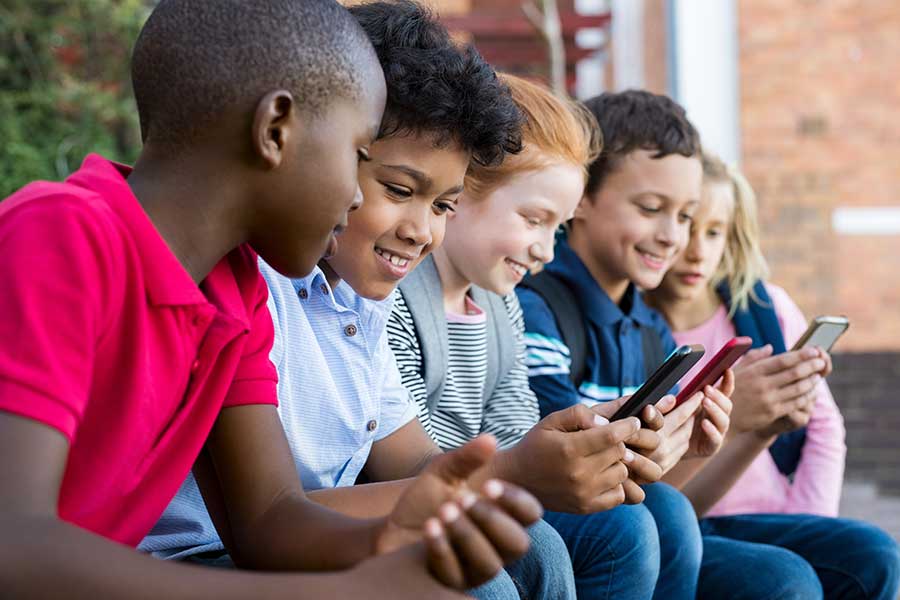Kids and Cellphones: How Young is Too Young?

Photo credit: Getty Images
There will come a day when every parent has to face the great 21st century debate—to give your child a cellphone or not. So, how do you know when the time has actually come to bestow such a responsibility on your kids? We sat down with Dr. Katie Kurivial, a psychologist on-staff at Episcopal Academy to learn more about the dos and don’ts of kids and cellphones. Here are her top tips to remember before handing over the line to cellphone freedom.
Age isn’t the primary decision factor, personality is.
Although it seems like kids are getting cellphones at younger ages each year, Kurvivial says that most often it happens in middle school and that there isn’t a set age range parents should abide by. “There’s no exact age when kids are ready for a cellphone,” says Kurivial. “Developmentally the curve is large in middle school—a well behaved and mature sixth grader could be more responsible with a cellphone than an irresponsible, impulsive eighth grader—it depends on the child.”
Cellphones do have a psychological impact.
“There is a direct link between interacting through a screen rather than face-to-face peer interaction and an increase in children’s anxiety, depression, and poor social skills,” says Kurivial. “They feel isolated and alone even if they’re in constant contact with their peers online. Poor sleep habits are also connected to screen use, which can increase depression and anxiety in children. She also warns that children aren’t mentally developed enough to comprehend their access to the internet and social media and the consequences that may come with using them. In recent years, it’s become such an essential topic, schools have started offering seminars and coursework on digital citizenship and online safety.
There are other means of communication.
It’s understandable for parents to want an easy means of accessing their child at any time as a safety precaution, but Kurivial urges parents to consider other options. “iPod touches with iMessage are a great alternative,” she explains. “It’s also important to remember a child’s first phone does not need to be a smartphone. Every provider still has non-smartphone plans that only allow a certain amount of calls and texts per month.”
FOMO does not necessarily justify a phone.
The dreaded day will come when one of your child’s best friends gets their first phone and the begging will begin. So, what’s your game plan? “Fear of missing out is a real fear for kids, so you need to talk with them and brainstorm a few options that help your child feel connected to their social world,” says Kurivial. “Work together on coming up with ways they can still stay in the loop but limit their device usage and earn cellphone privileges.”
Kids learn by example.
If you’re on your phone at the dinner table, your kids are going to feel free to do the same. “Dinners are a great opportunity for a phone-free zone for everyone, not just the kids,” says Kurivial. It’s also important to start monitoring your and your children’s digital intake early, before school age. Kids pick up digital knowledge quicker and younger than ever before. “When they’re crying in the grocery store, it might be tempting to hand over a device, but children need to learn to soothe without technology,” she says. “Make sure that when they go to bed, they aren’t playing on the device or keeping them in their rooms.” When a child is allowed screen time using a parent’s phone or tablet when they are young, it can be confusing and frustrating when they are all of a sudden limited when they get a little bit older. Another good tip from Kurivial, “Don’t use your phone when you drive, so they won’t text when they drive.”
Use the resources available to you.
Parental controls, access to passwords and online resources should all be your friend when it comes to parenting a cellphone-bearing child. “Parents should always have the passwords to everything on their child’s device,” says Kurivial. “Don’t spy on your kids, but do have an open conversation and let them know you’ll be checking in regularly.” Aside from manually checking their phone, Kurivial encourages parents to tap into services their wireless providers already have in place—like setting a time for the Wi-Fi to automatically disconnect from their phone. You can also check out resources like childmind.org, which is chock full of helpful tips on phone safety and dealing with digital drama.
Schedule a visit to The Episcopal Academy to learn more about how the faculty help teach students about digital citizenship and cyber safety.
This is a paid partnership between Episcopal Academy and Philadelphia Magazine


